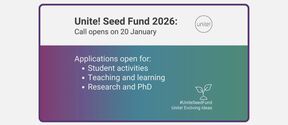A summer job at the University is independent and flexible, but requires a lot of initiative

At the end of June, the campus at Otaniemi quietens down as the students head for summer pastures. Whilst studies are taking a well-earned break, some students spend their summer break working at the University. This summer there are over 50 students working at the School of Electrical Engineering.
One of them is Thomas van Gemert from the Netherlands. His interest in human and computer systems interactions led him apply to Master's Programme in Computer, Communication and Information Sciences. van Gemert ended up with a summer job at the Department of Communications and Networking when professor Antti Oulasvirta asked him to work in his research team where they investigate novel computational methods for design and adaptation of user interfaces.
”Working at Aalto is quite relaxed: The group has a nice atmosphere and I'm learning a lot, apart from just coding. I'm also working a bit on simulating emotions in computers, something that interests me particularly. The best thing is that alongside working, I can take part in interesting lectures and courses”, van Gemert says.
A summer job at the School of Electrical Engineering gives the students an opportunity to experience working in a research project. Securing a placement in a summer project may require proof of applicable background studies and good grades from technically challenging subjects. It is beneficial to be pro-active, and it is possible to secure a summer job even after the first year of study. The University’s aim is to offer flexible and pleasant summer jobs, through which the students can deepen their knowledge of their chosen subject.
Helena HilanderI appreciate the fact that I have been given a chance to see what working in a research project is like.
Electrical engineering student Oskari Ojala works at the Department of Signal Processing and Acoustics. His job is to computer model the process of measuring light with Matlab-program. He also discusses the topic in his Bachelor's thesis which is due to be completed during the summer.
”Working here is interesting and the standard of research is high. The work requires a lot of initiative, which also provides opportunities but also responsibility. Self-motivation plays a key role.”
Some of the summer workers get to apply their learning experiences and to work on University courses. For example, Harri Aaltonen, who is studying in Master’s Programme in Automation and Electrical Engineering, performs tasks that relate to the development of the Automation-course. He designs practise assignments and platforms for micro control exercises.
Experience gained from a research project, as well getting more familiar with the academic world, may inspire students for further studies. Some of the summer work projects end up being published as articles that are co-written by the summer trainees, and which may be helpful in finding a job. Helena Hilander, who is starting her second year of Bachelor’s degree studies in Bioinformation Technology, and works at the Department of Electronics and Nanoengineering, finds having a summer job at the University also beneficial for planning future studies:
”I appreciate the fact that I have been given a chance to see at an early stage of my studies what working in a research project is like. This helps significantly when planning my own career”, she says.
Read more news

Major funding powers development of next-generation machine technology aimed at productivity leap in export sectors
The BEST research project is developing new types of sealing, bearing, and damping technology.
Unite! Seed Fund 2026: Call opens on 20 January 2026
Gain an early overview of the Unite! Seed Fund Call of Spring 2026. The call includes three funding lines: Student Activities, Teaching and Learning, and Research and PhD.
Deepika Yadav leverages technology to improve women's health
Deepika Yadav recently began as an assistant professor at the Department of Computer Science in the field of human-computer interaction (HCI) and interaction design for health and wellbeing.






